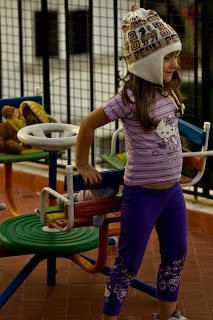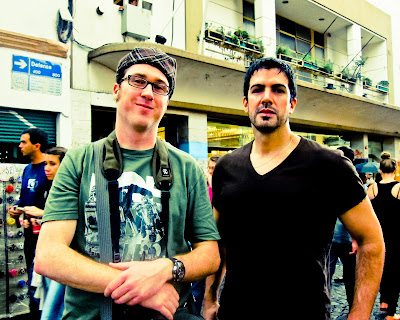 |
| Balcony Play |
 |
| Missing Teeth |
As most of us know, child rearing differs from culture to
culture. As Americans, I feel as though
we have an underlying attitude of “we’ve got it all figured out.” I worked as a
nanny for ten years and as a teacher for nearly two, I have had a chance to observe
both the experiments and the results. Do
we in the US have child rearing down to a science? Of course not, but we do have certain ideas
and trends that claim to be the recipe for how to produce a healthy kid. Just a few for examples: kids go to bed early,
the more sleep they get the better. Sugar is BAD, organic food a must, TV
depletes brain cells, and hand sanitizer can be found in the purse of nearly
every mama in America. As a nanny, I
have been asked to follow very specific
verbal and sometimes written instructions that carefully detail exactly how to
handle the goods, so that I can aid them in becoming productive and well suited
members of society. I want to note
though that many families I have worked for have been wonderful, but I have
come across a few crazies in my lifetime.
Traveling presents an opportunity to observe child rearing
in a new light. While living in Buenos
Aires, I have been observing and noting trends that differ from the norms in
the US. Here are some examples: young children in Argentina stay up well past
midnight, they guzzle down soda like its going out of style, even caffeinated stuff
like Coca Cola, and sometimes coffee. Gasp.
They breath ridiculously polluted air, learn to crawl and walk on filthy
sidewalks, they play on playgrounds with equipment that looks as though it were
built during the turn of the century, and would have any American parent in a
conniption, organic food is incredibly hard to come by, and last but not least,
they have shorter school days. Not only
that, but they are sometimes held responsible for walking home, eating lunch, and
then returning back to school on their own.
So, what does all of this sugar, germs, lack of sleep, and unfathomable
(by US standards) self responsibility produce?
Completely well adjusted, well learned, friendly, worldly and hospitable
human beings. Imagine that. While no society is perfect, Argentina and
the US being far from it, I have personally experienced hospitality and
kindness here unlike anything I have ever encountered back home. As a teacher of Argentine children, I find kids
here to be just as curious, kind, intelligent, and sometimes as bratty as
American kids back home. What does this
tell me? That the US does not rule the
world with the answers of how to raise a perfect child. Therefore, we should think twice before we
judge and decide without a doubt that our ways are the best.
 |
| Sisters |























